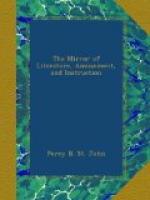to have been his study; and in his study, and
at his literary enjoyments, he died. Every thing
is preserved with a reverential care that does
honour to the people; and his chair, like less
holy and less credible relics, is inclosed in
a wire-frame, to prevent the dilapidations of
the curious. I believe these things to be genuine.
I believe in the local traditions that point out his
study, and his kitchen, and his dying chamber.—Petrarch
was all but idolized in his own time, and his
fame has known no diminution; therefore these
affectionate recollections of him have always
been treasured there for the gratification of his
pilgrims, and with a becoming reverence themselves,
the people naturally set apart as sacred all that
belonged to him. I have noticed the compactness
of his few rooms, and their separation from the
larger apartments—they have also a separate
communication by a small elegant flight of steps
into the garden, as you may see in Prout’s
drawing. If the rooms were not an addition,
and it did not suggest itself at the moment to
look attentively, I believe these little architectural
and ornamental steps to have been; and as we know
he did meddle with brick and mortar, by building
a small chapel here, the conjecture is not improbable;—it
is but a conjecture, and remains for others to
confirm or disprove.
A little wild, irregular walk runs, serpent like, all round the garden, which, situated at the head of the valley, is shut in by the hills—itself a wilderness of luxuriance and beauty. It was a glorious evening, and every thing in agreement with our quiet feeling. I am not an enthusiast, and to you I need not affect to be other than I am; but I have felt this day sensibly, and shall remember it for ever. Petrarch’s fame is worth the noise and nothing of all the men-slayers since Cain! It is fame indeed, holy and lovely, when the name and reputation of a man, remembered only for wisdom and virtue, shall have extended into remote and foreign kingdoms with such a sound and echo, that centuries after a stranger turns aside into these mountains to visit his humble dwelling. It is the verification of the prediction of Boccaccio—“This village, hardly known even at Padua, will become famous through the world.” I do not presume to offer a eulogy on Petrarch as a writer, but as a man. In all the relations of son, brother, father, he is deserving all honour; and I know not another instance of such long-continued, sincere, and graceful friendships, through all varieties of fortune, from the Cardinal of Cabassole, to the poor fisherman at Vaucluse, as his life offers; including literary friendships, which, after so many years, passed without one discordant feeling of rivalry or jealousy, ended so generously and beautifully, with his bequest to poor Boccaccio of “five hundred florins of the gold of Florence, to buy him a winter habit for his evening studies,” and this noble testimony of his ability in addition—“I




